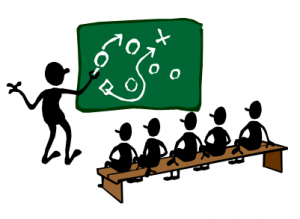What is the Differences Between Sales Training and Sales Coaching in Business Learning?

While they are closely related and have the same end goal, they differ in purpose and approach. Sales training and sales coaching each have their own focus. What is the differences between sales training and sales coaching in business learning?
What’s the Difference Between Sales Training and Sales Coaching?
The easiest way to see the difference between the sales training and sales coaching is to view training as the foundation on which you build everything else. Without training, your sales reps can’t sell as easily.
One of the layers you build on top of the training foundation is coaching. Sales coaching is the continuous activities and lessons customized to an individual rep by focusing on their skills and reinforcing optimal sales behavior. This is similar to working with a business coach.
To put it simply: sales training provides sales reps with the rudiments of how to sell a product or service, while sales coaching provides sales reps with opportunities to keep improving their skills and attaining their goals. Let’s break it down even further.
The Differences Between Sales Training and Sales Coaching in Business Learning
These are the basics: sales training is given to sales reps at the start of their sales journey to provide them with the tools like meeting invite templates which they need to start working in sales. You want to give your sales representatives the right tools and information to get started so they can hit their sales goals.
But you can’t just stop at training. Sales coaching is where individual sales reps’ needs and personal circumstances are the main focus. Through sales coaching, you share your most experienced reps’ expertise with the rest of the team.
Your company benefits in many ways from sales training and coaching, but the most critical advantage is that they help ensure that your team meets their targets.
Importance of Sales Training
Sales training is provided to every seller in your sales force. The goal is to equip every sales rep on your team with the skills and resources needed to contribute to the team and grow. Through sales training, your sales representatives learn the techniques and strategies they need to competently sell company products or services.
For instance, teaching your team the correct jargon they’ll need to know to market your bugs tracking software.
New Sales Representatives
When sales representatives start at a new company or position, there are new clients, competitors, and management structures. For maximum efficiency, everyone on the sales team needs to understand and adopt your company’s sales practices as quickly as possible.
But this can be overwhelming for new sales representatives hired into your company or when they move to a new position. This is especially so since many recruits would be Gen Z joining the workforce. This is where sales training proves its benefits.
Sales Training Benefits
During training, your teams will learn actionable strategies and best practices that will serve them in every type of sales environment. This training teaches your sales reps ethics, how to build customer relationships, and helps them develop personally and professionally.
Your sales reps will also learn how to recognize and exceed your customer’s needs and expectations, your company’s products or services, your company’s sales cycle, and the Standard Operating Procedure for sales. Sales training can be highly effective in that you would be acclimating veteran sales reps and educating new sales reps.
This empowers both groups of sales representatives to come up tp speed quickly and become productive members of your sales team.
Importance of Sales Coaching
While sales training focuses on developing groups of sales reps, sales coaching focuses on the individual sales rep. Sales coaching helps professional sales reps fix their own specific weaknesses and promotes personal development.
Encouraging and Enabling Sales Teams
Every sales team has a quota, goal, or number of sales they need to hit. Sales leaders have the experience and knowledge to help their teams reach that number. They can do this by encouraging and enabling their teams with practice, guidance, feedback, and tools they can use to succeed with a client.
By using sales coaching, every sales rep can meet their goal, as well as, contribute to the overall goal of the company. Sales coaching needs to be ongoing and customized to the individual by focusing on their skills and reinforcing great sales behavior. These are just some of the ways to close more sales.
Individualized Model of Sales Coaching
The individualized model of sales coaching allows a sales rep and their coach to collaborate one-on-one. They will work together to discover any weaknesses the sales rep might have.
The coach may even sometimes join a sales rep on a business call to observe their performance. Sales reps each have their own strengths and weaknesses, but a lot of individual performance diminishes due to:
-
- Subpar lead research which can lead to rejections and failures
- Poor preparation for calls like using the wrong WebEx alternatives
- Poor interpersonal skills and inability to sustain relationships
- Ineffective sales pipeline construction
- Fundamental flaws in the sales rep’s
After identifying core weaknesses, the sales rep and their coach collaborate to create a development plan to ensure steady success.
Differences Between Sales Training and Sales Coaching
As a football metaphor, sales training is when you have new recruits joining your team. You teach them the rules of the game and some strategies your team uses to get results. Sales coaching is what comes after that initial training. The coach works with each player to help them improve personally and address any weaknesses.
Sales training helps your company by laying a solid foundation and setting up new sales reps for success, by giving them the right tools and practices from the start. That is why it’s important to avoid making common training mistakes. Sales coaching ensures that success continues by identifying each individual sales rep’s weaknesses and empowering them to continually improve.
 Author Bio: Grace Lau is the Director of Growth Content at Dialpad, an AI-powered small business phone platform for better and easier team collaboration. She has over 10 years of experience in content writing and strategy. Currently, she is responsible for leading branded and editorial content strategies, partnering with SEO and Ops teams to build and nurture content. Grace Lau also published articles for domains such as Workpuls and Bplans. Here is her LinkedIn.
Author Bio: Grace Lau is the Director of Growth Content at Dialpad, an AI-powered small business phone platform for better and easier team collaboration. She has over 10 years of experience in content writing and strategy. Currently, she is responsible for leading branded and editorial content strategies, partnering with SEO and Ops teams to build and nurture content. Grace Lau also published articles for domains such as Workpuls and Bplans. Here is her LinkedIn.
















It sure was nice that you said that sales training could help to build customer relationships and could teach sales reps the right ethics. Many businesses will surely consider this tip, especially if they aim to equip their people with the right sales and leadership skills. I could imagine how the right training could provide a better confidence level for every sales representative.